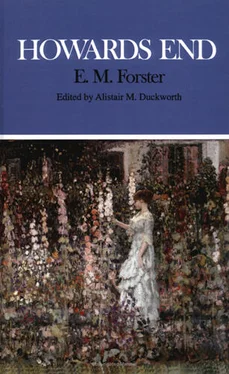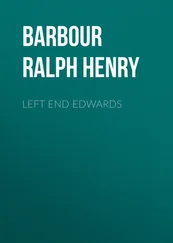Edward Morgan Forster - Howards End
Здесь есть возможность читать онлайн «Edward Morgan Forster - Howards End» весь текст электронной книги совершенно бесплатно (целиком полную версию без сокращений). В некоторых случаях можно слушать аудио, скачать через торрент в формате fb2 и присутствует краткое содержание. Жанр: Классическая проза, на английском языке. Описание произведения, (предисловие) а так же отзывы посетителей доступны на портале библиотеки ЛибКат.
- Название:Howards End
- Автор:
- Жанр:
- Год:неизвестен
- ISBN:нет данных
- Рейтинг книги:3 / 5. Голосов: 1
-
Избранное:Добавить в избранное
- Отзывы:
-
Ваша оценка:
- 60
- 1
- 2
- 3
- 4
- 5
Howards End: краткое содержание, описание и аннотация
Предлагаем к чтению аннотацию, описание, краткое содержание или предисловие (зависит от того, что написал сам автор книги «Howards End»). Если вы не нашли необходимую информацию о книге — напишите в комментариях, мы постараемся отыскать её.
Howards End — читать онлайн бесплатно полную книгу (весь текст) целиком
Ниже представлен текст книги, разбитый по страницам. Система сохранения места последней прочитанной страницы, позволяет с удобством читать онлайн бесплатно книгу «Howards End», без необходимости каждый раз заново искать на чём Вы остановились. Поставьте закладку, и сможете в любой момент перейти на страницу, на которой закончили чтение.
Интервал:
Закладка:
Chapter 28
For many hours Margaret did nothing; then she controlled herself, and wrote some letters. She was too bruised to speak to Henry; she could pity him, and even determine to marry him, but as yet all lay too deep in her heart for speech. On the surface the sense of his degradation was too strong. She could not command voice or look, and the gentle words that she forced out through her pen seemed to proceed from some other person.
"My dearest boy," she began, "this is not to part us. It is everything or nothing, and I mean it to be nothing. It happened long before we ever met, and even if it had happened since, I should be writing the same, I hope. I do understand."
But she crossed out "I do understand"; it struck a false note. Henry could not bear to be understood. She also crossed out, "It is everything or nothing. "Henry would resent so strong a grasp of the situation. She must not comment; comment is unfeminine.
"I think that'll about do," she thought.
Then the sense of his degradation choked her. Was he worth all this bother? To have yielded to a woman of that sort was everything, yes, it was, and she could not be his wife. She tried to translate his temptation into her own language, and her brain reeled. Men must be different, even to want to yield to such a temptation. Her belief in comradeship was stifled, and she saw life as from that glass saloon on the Great Western, which sheltered male and female alike from the fresh air. Are the sexes really races, each with its own code of morality, and their mutual love a mere device of Nature to keep things going? Strip human intercourse of the proprieties, and is it reduced to this? Her judgment told her no. She knew that out of Nature's device we have built a magic that will win us immortality. Far more mysterious than the call of sex to sex is the tenderness that we throw into that call; far wider is the gulf between us and the farmyard than between the farm-yard and the garbage that nourishes it. We are evolving, in ways that Science cannot measure, to ends that Theology dares not contemplate. "Men did produce one jewel," the gods will say, and, saying, will give us immortality. Margaret knew all this, but for the moment she could not feel it, and transformed the marriage of Evie and Mr. Cahill into a carnival of fools, and her own marriage—too miserable to think of that, she tore up the letter, and then wrote another:
Dear Mr. Bast,
I have spoken to Mr. Wilcox about you, as I promised, and am sorry to say that he has no vacancy for you.
Yours truly,
M. J. Schlegel
She enclosed this in a note to Helen, over which she took less trouble than she might have done; but her head was aching, and she could not stop to pick her words:
Dear Helen,
Give him this. The Basts are no good. Henry found the woman drunk on the lawn. I am having a room got ready for you here, and will you please come round at once on getting this? The Basts are not at all the type we should trouble about. I may go round to them myself in the morning, and do anything that is fair.
M
In writing this, Margaret felt that she was being practical. Something might be arranged for the Basts later on, but they must be silenced for the moment. She hoped to avoid a conversation between the woman and Helen. She rang the bell for a servant, but no one answered it; Mr. Wilcox and the Warringtons were gone to bed, and the kitchen was abandoned to Saturnalia. Consequently she went over to the George herself. She did not enter the hotel, for discussion would have been perilous, and, saying that the letter was important, she gave it to the waitress. As she recrossed the square she saw Helen and Mr. Bast looking out of the window of the coffee-room, and feared she was already too late. Her task was not yet over; she ought to tell Henry what she had done.
This came easily, for she saw him in the hall. The night wind had been rattling the pictures against the wall, and the noise had disturbed him.
"Who's there?" he called, quite the householder.
Margaret walked in and past him.
"I have asked Helen to sleep," she said. "She is best here; so don't lock the front-door."
"I thought someone had got in," said Henry.
"At the same time I told the man that we could do nothing for him. I don't know about later, but now the Basts must clearly go."
"Did you say that your sister is sleeping here, after all?"
"Probably."
"Is she to be shown up to your room?"
"I have naturally nothing to say to her; I am going to bed. Will you tell the servants about Helen? Could someone go to carry her bag?"
He tapped a little gong, which had been bought to summon the servants.
"You must make more noise than that if you want them to hear."
Henry opened a door, and down the corridor came shouts of laughter. "Far too much screaming there," he said, and strode towards it. Margaret went upstairs, uncertain whether to be glad that they had met, or sorry. They had behaved as if nothing had happened, and her deepest instincts told her that this was wrong. For his own sake, some explanation was due.
And yet—what could an explanation tell her? A date, a place, a few details, which she could imagine all too clearly. Now that the first shock was over, she saw that there was every reason to premise a Mrs. Bast. Henry's inner life had long laid open to her—his intellectual confusion, his obtuseness to personal influence, his strong but furtive passions. Should she refuse him because his outer life corresponded? Perhaps. Perhaps, if the dishonour had been done to her, but it was done long before her day. She struggled against the feeling. She told herself that Mrs. Wilcox's wrong was her own. But she was not a bargain theorist. As she undressed, her anger, her regard for the dead, her desire for a scene, all grew weak. Henry must have it as he liked, for she loved him, and some day she would use her love to make him a better man.
Pity was at the bottom of her actions all through this crisis. Pity, if one may generalize, is at the bottom of woman. When men like us, it is for our better qualities, and however tender their liking, we dare not be unworthy of it, or they will quietly let us go. But unworthiness stimulates woman. It brings out her deeper nature, for good or for evil.
Here was the core of the question. Henry must be forgiven, and made better by love; nothing else mattered. Mrs. Wilcox, that unquiet yet kindly ghost, must be left to her own wrong. To her everything was in proportion now, and she, too, would pity the man who was blundering up and down their lives. Had Mrs. Wilcox known of his trespass? An interesting question, but Margaret fell asleep, tethered by affection, and lulled by the murmurs of the river that descended all the night from Wales. She felt herself at one with her future home, colouring it and coloured by it, and awoke to see, for the second time, Oniton Castle conquering the morning mists.
Chapter 29
"Henry dear—" was her greeting.
He had finished his breakfast, and was beginning the Times . His sister-in-law was packing. She knelt by him and took the paper from him, feeling that it was unusually heavy and thick. Then, putting her face where it had been, she looked up in his eyes.
"Henry dear, look at me. No, I won't have you shirking. Look at me. There. That's all."
"You're referring to last evening," he said huskily. "I have released you from your engagement. I could find excuses, but I won't. No, I won't. A thousand times no. I'm a bad lot, and must be left at that."
Expelled from his old fortress, Mr. Wilcox was building a new one. He could no longer appear respectable to her, so he defended himself instead in a lurid past. It was not true repentance.
Читать дальшеИнтервал:
Закладка:
Похожие книги на «Howards End»
Представляем Вашему вниманию похожие книги на «Howards End» списком для выбора. Мы отобрали схожую по названию и смыслу литературу в надежде предоставить читателям больше вариантов отыскать новые, интересные, ещё непрочитанные произведения.
Обсуждение, отзывы о книге «Howards End» и просто собственные мнения читателей. Оставьте ваши комментарии, напишите, что Вы думаете о произведении, его смысле или главных героях. Укажите что конкретно понравилось, а что нет, и почему Вы так считаете.












